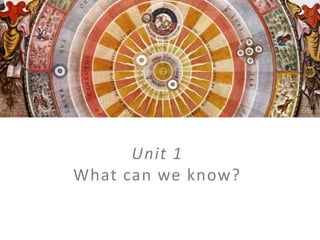Unit 1. What can we know?
•Download as PPTX, PDF•
4 likes•599 views
Unit 1. What can we know? [Philosophy of Science]
Report
Share
Report
Share

Recommended
More Related Content
Similar to Unit 1. What can we know?
Similar to Unit 1. What can we know? (20)
Classical and Modern Philosophy: Rationalism and Empiricism .pptx

Classical and Modern Philosophy: Rationalism and Empiricism .pptx
Ferrarello (2013) phenomenological philosophy -an introduction for psychologists

Ferrarello (2013) phenomenological philosophy -an introduction for psychologists
Classic and Modern Philosophy: Rationalism and Empicism

Classic and Modern Philosophy: Rationalism and Empicism
What are the limitations of rationalism of empiricismSolutio.pdf

What are the limitations of rationalism of empiricismSolutio.pdf
Paper # 11. READ THE ARTICLE THAT FOLLOWS THESE INSTRUCT.docx

Paper # 11. READ THE ARTICLE THAT FOLLOWS THESE INSTRUCT.docx
More from Nadia Gabriela Dresscher
Unit 4. Sociology in Context: "islandness", the uniqueness of the caribbean and ArubaUnit 4. Sociology in Context: "islandness", the uniqueness of the Caribbean ...

Unit 4. Sociology in Context: "islandness", the uniqueness of the Caribbean ...Nadia Gabriela Dresscher
More from Nadia Gabriela Dresscher (20)
Unit 4. Sociology in Context: "islandness", the uniqueness of the Caribbean ...

Unit 4. Sociology in Context: "islandness", the uniqueness of the Caribbean ...
Unit 3 changing patterns of society without videos

Unit 3 changing patterns of society without videos
Unit 2. the awakening of the sociological imagination part 2

Unit 2. the awakening of the sociological imagination part 2
Unit 1. The Awakening of the Sociological Imagination part 1

Unit 1. The Awakening of the Sociological Imagination part 1
Unit 6. Case study: empirical or interpretative approach

Unit 6. Case study: empirical or interpretative approach
Recently uploaded
Mehran University Newsletter is a Quarterly Publication from Public Relations OfficeMehran University Newsletter Vol-X, Issue-I, 2024

Mehran University Newsletter Vol-X, Issue-I, 2024Mehran University of Engineering & Technology, Jamshoro
https://app.box.com/s/7hlvjxjalkrik7fb082xx3jk7xd7liz3TỔNG ÔN TẬP THI VÀO LỚP 10 MÔN TIẾNG ANH NĂM HỌC 2023 - 2024 CÓ ĐÁP ÁN (NGỮ Â...

TỔNG ÔN TẬP THI VÀO LỚP 10 MÔN TIẾNG ANH NĂM HỌC 2023 - 2024 CÓ ĐÁP ÁN (NGỮ Â...Nguyen Thanh Tu Collection
Recently uploaded (20)
Russian Escort Service in Delhi 11k Hotel Foreigner Russian Call Girls in Delhi

Russian Escort Service in Delhi 11k Hotel Foreigner Russian Call Girls in Delhi
Python Notes for mca i year students osmania university.docx

Python Notes for mca i year students osmania university.docx
TỔNG ÔN TẬP THI VÀO LỚP 10 MÔN TIẾNG ANH NĂM HỌC 2023 - 2024 CÓ ĐÁP ÁN (NGỮ Â...

TỔNG ÔN TẬP THI VÀO LỚP 10 MÔN TIẾNG ANH NĂM HỌC 2023 - 2024 CÓ ĐÁP ÁN (NGỮ Â...
Mixin Classes in Odoo 17 How to Extend Models Using Mixin Classes

Mixin Classes in Odoo 17 How to Extend Models Using Mixin Classes
Food safety_Challenges food safety laboratories_.pdf

Food safety_Challenges food safety laboratories_.pdf
On National Teacher Day, meet the 2024-25 Kenan Fellows

On National Teacher Day, meet the 2024-25 Kenan Fellows
Micro-Scholarship, What it is, How can it help me.pdf

Micro-Scholarship, What it is, How can it help me.pdf
Unit 1. What can we know?
- 1. Unit 1 What can we know?
- 3. Write down what you think science is Name five examples
- 4. The traditional view of science Science comes from the Latin word scientia which means knowledge. Science gives us knowledge of reality. This knowledge is objective, generalisable, controllable
- 5. Philosophy comes from the Greek φιλοσοφία (philosophia) which means love of wisdom. Philosophy studies general and fundamental problems. The philosophy of science can help us reflect on the nature of science.
- 7. The definition of science effects real life
- 10. Deductive reasoning goes from all (a general rule) to one (a specific case). Inductive reasoning goes from one (a bunch of single data) to all (a general conclusion). A priori= before experience A posteriori = after experience
- 12. Descartes (1596-1650): Doubt your senses
- 13. What if there is no God, but just an evil demon tricking us Then I might be sleeping, dreaming I am awake
- 14. But the demon can never trick me into the idea I don’t exist. Cogito ergo sum?
- 18. Deduction Deduction is logical reasoning. Deductive knowledge is a priori knowledge that is known independent of experience. Deductive arguments are purely logical.
- 19. a deductive inference Standard example of a deductive inference: Premises All men are mortal. Socrates is a man. Conclusion Socrates is mortal.
- 21. Induction Inductive knowledge is knowledge based on sensory experience. Inductive knowledge is a posteriori knowledge, knowledge that is gained by experience (that is, it is empirical, or arrived at afterward).
- 22. David Hume’s (1711-1776) fork
- 23. Analytic: statements about ideas Synthetic: statements about the world
- 24. Example of an analytical sentence: All bachelors are unmarried. Example of a synthetic sentence: All bachelors are bald.
- 25. Hume’s problem was that it is almost impossible to go from synthetic to analytic statements.
- 26. Because we can never relate the analytic sentences to the real world it is meaningless, they only speaks about them self. Consider the example of the bachelor: it is a tautological sentence, it is always valid regardless of your data.
- 27. A thousand white swans Take the example of a white swan. Can we be certain that if we see a thousand white swans, that all swans are white? No. Even if we have a thousand observations like: this swan is white, we can never relate this to the rule all swans are white. Only if we would see every swan in the universe – now and in the future- which is impossible.
- 28. The fact that the sun has risen everyday up until now may not prove that it will rise tomorrow, but surely it gives us a very good reason to think it will?
